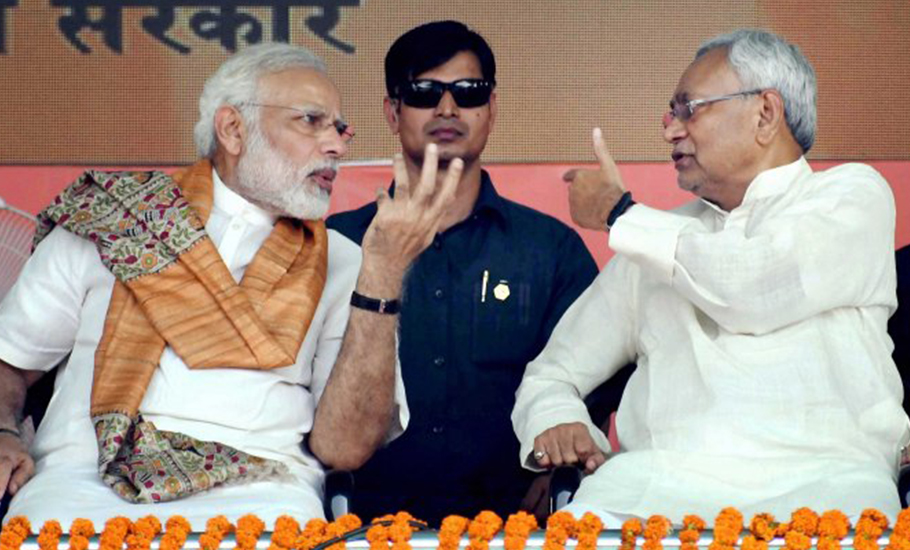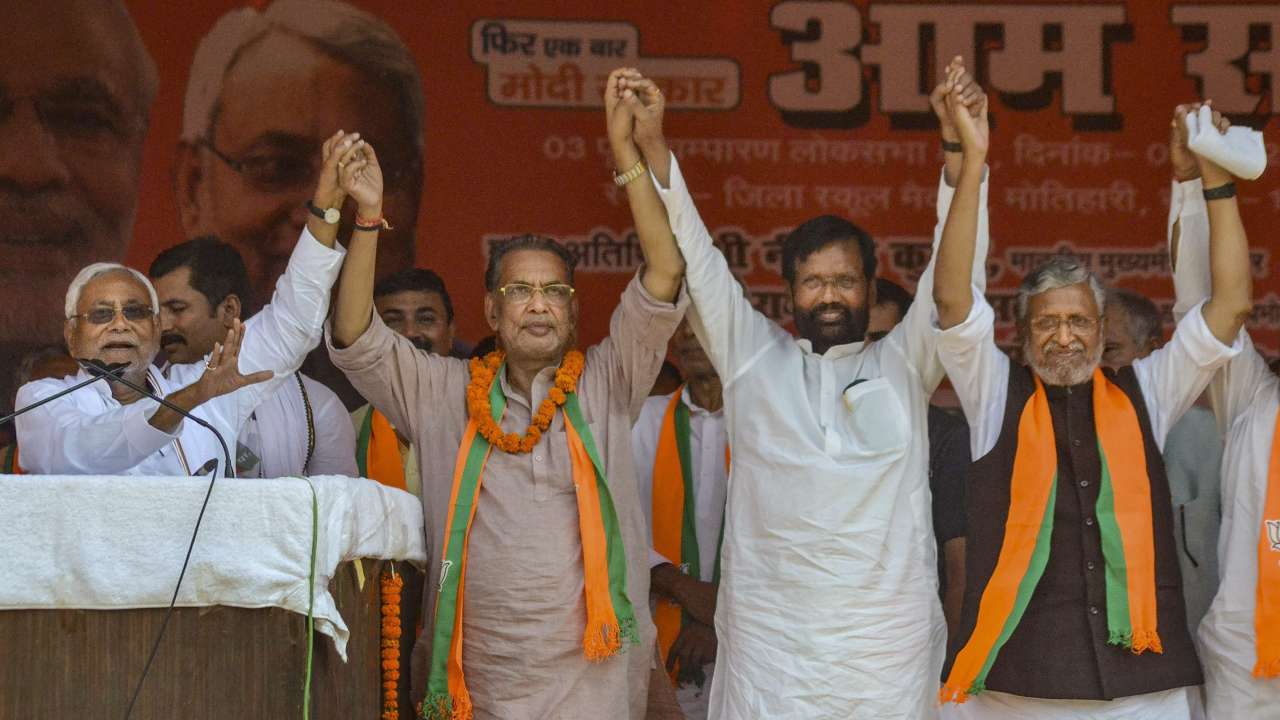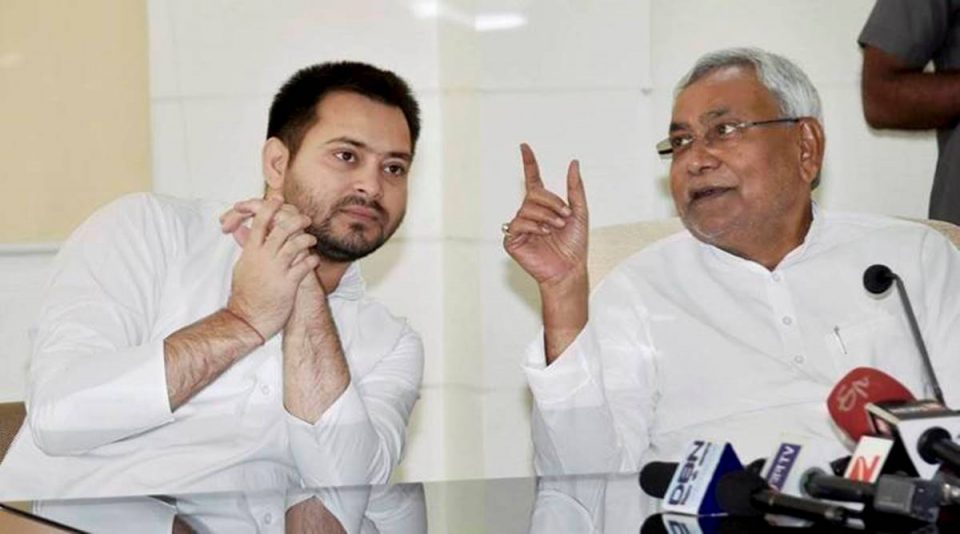
- Home
- News
- Analysis
- States
- Perspective
- Videos
- Education
- Entertainment
- Elections
- World Cup 2023
- Features
- Health
- Budget 2024-25
- Business
- Series
- NEET TANGLE
- Economy Series
- Earth Day
- Kashmir’s Frozen Turbulence
- India@75
- The legend of Ramjanmabhoomi
- Liberalisation@30
- How to tame a dragon
- Celebrating biodiversity
- Farm Matters
- 50 days of solitude
- Bringing Migrants Home
- Budget 2020
- Jharkhand Votes
- The Federal Investigates
- The Federal Impact
- Vanishing Sand
- Gandhi @ 150
- Andhra Today
- Field report
- Operation Gulmarg
- Pandemic @1 Mn in India
- The Federal Year-End
- The Zero Year
- Premium
- Science
- Brand studio
- Home
- NewsNews
- Analysis
- StatesStates
- PerspectivePerspective
- VideosVideos
- Entertainment
- ElectionsElections
- Sports
- Loading...
Sports - Features
- Budget 2024-25
- BusinessBusiness
- Premium
- Loading...
Premium

Is Nitish Kumar's fight for political relevance irrelevant?

When the prime minister of the day finds fault in your ‘political DNA’, your chances of winning him may not seem so bright. When your ally calls you a Bhasmasur (demon), you may know your list of friends is getting shorter. And when your own partymen express reservations against your somersaults, it may seem your political career is almost over. But for Nitish Kumar, the game...
When the prime minister of the day finds fault in your ‘political DNA’, your chances of winning him may not seem so bright. When your ally calls you a Bhasmasur (demon), you may know your list of friends is getting shorter. And when your own partymen express reservations against your somersaults, it may seem your political career is almost over. But for Nitish Kumar, the game is never over till it is. If anything, the seven-time Bihar chief minister has skillfully navigated the political potholes and managed to stay in power, if not relevant.
A series of recent developments in Bihar – demand for caste-based census, probe into the Pegasus controversy and a ‘soft-pitch’ for prime ministership – has led many to believe that Nitish Kumar is looking for an excuse to make another of his famous walkovers and working out ways for a change in the alliance with the BJP in the state.
Nitish Kumar had re-joined hands with the BJP in 2017 (after splitting with the Rashtriya Janata Dal or RJD) over alleged corruption by his deputy CM and RJD leader Tajeshwi Yadav. Incidentally, Nitish had entered the ‘mahagathbadhan’ (grand alliance) – with RJD, Congress and others – in 2015 after snapping ties with alliance partner BJP in 2013. Back then, Nitish Kumar had issues with Narendra Modi’s nomination as the prime ministerial candidate.

But, as they say, time and politics keep changing. After the 2020 assembly election that the JD(U) and BJP fought together, Nitish’s party emerged as a junior partner with just 43 seats compared to the BJP’s 74 in the 243-seat Assembly.
New churn
Although the ‘junior partner’ has previously differed with the BJP over a host of issues – scrapping of Article 370 provisions, uniform civil code, National Register of Citizens, the National Population Register, population control laws etc – there was a new churn in July following Prime Minister cabinet expansion wherein the JD(U) had to stay content with just one berth allotted to RCP Singh. The disgruntlement was quite apparent as none from JD(U) other than RCP Singh, attended the glittering ceremony.
Days later, when Uttar Pradesh chief minister Yogi Adityanath announced a new population policy for his state, Nitish ‘slam-dunked’ it by asserting that educating the girls would do more to bring down the fertility rate. This was followed by another bout of defiance when he demanded a caste-based census soon after the NDA government rejected the idea in Parliament.
In yet another unexpected move in August, Nitish asked for a probe into the Pegasus snooping controversy. “There must be a debate, there must be a discussion. The right steps must be taken after looking at the facts,” Kumar told the media on the sidelines of his Janata Durbar in Patna. In this demand too, Nitish ‘teamed up’ with the opposition parties even though he maintained that his statement was a personal opinion.
The ante was upped again during a two-day national council meeting of the Janata Dal United (JDU) in August end when the party said the Bihar chief minister has all the qualities to become the Prime Minister but he is not in the race for the post. With that, Nitish became the first ally to be propped as a possible challenger to PM Modi.
Even though Nitish himself brushed aside the possibility, saying he neither wants nor expects this, his party colleagues say it was a fact that he could prove to be a better Prime Minister for the country in the future.
According to senior JD(U) leader Upendra Kushwaha, it is not about challenging PM Modi. “People made Narendra Modi PM today and he’s doing good work. But there are others in the country who have the potential to become PM. Of them is Nitish Kumar. He should be called PM-material and it’s not about challenging PM Modi.”
Those closely observing the developments believe all these are tell-tale signs of another possible switchover by Nitish, considering the man’s penchant for changing sides.
But are these really signs of an impending break-up?
Reading between the lines
Senior journalist and political analyst Priyaranjan Bharti says the relationship between BJP and JD (U) is far from normal as there is a clear lack of coordination and trust between the two. According to him, Nitish may be fearing that the BJP will replace him as chief minister with its own leader. “And if that happens, Nitish will be left with no other option but to quit the NDA,” Bharti adds.
But if political analyst Sanjay Kumar is to be believed, speculation over the break-up of the alliance holds no water. “Bihar CM is left with no option other than to stay with the BJP. Even if Nitish walks out of the NDA, where would he go. The RJD-led grand alliance will not accept him as chief minister anymore, as Tejashwi is undisputedly willing to fill the slot whenever the opportunity arises.”
Then why does Nitish seem hell bent on rubbing the BJP the wrong way?
A JD(U) insider admits that the latest moves are also indicative of regional parties’ desperation to remain relevant in their respective states, especially when in alliance with a giant votecatcher like the BJP. “It’s either do or die. Regional parties have to maintain their individuality as well,” he adds.
It is the same reason why Nitish dismissed demands by BJP MLA Hari Bhushan Thakur Bachol to rename Bakhtiyarpur – a town named after Bakhtiyar Khilji, the military general of Qutb-ud-Din-Aibak, who destroyed the famed Nalanda University. “It is sheer nonsense. Bakhtiyarpur is my birthplace, who will change its name?” he recently thundered to journalists eliciting his response on the issue.
A look at the political career of Nitish Kumar
A look at the political career of Nitish Kumar
Again, as recently as September end, the JD(U) made it clear that it sought to contest assembly elections in Uttar Pradesh, even if that means going it alone. The party made it clear that it would prefer to have a truck with BJP, but if that did not materialise, it will go ahead and fight the elections anyway.
Likewise, on the caste census demand, while the BJP-led central government is clearly reluctant about the exercise – despite a unanimous demand by all parties – Nitish has gone on record to say that he would go ahead with it in his state even if the Centre does not agree.
But doubts have been raised over its intentions as well.
According to CPI (M) leader Awadhesh Kumar, Nitish will never gather courage to carry out enumeration of OBCs in the caste census, if the BJP opposes it. “Instead, he will keep requesting the Centre to reconsider its decision until the next Lok Sabha elections are held in 2024.”
Bharti thinks otherwise. He is confident that Nitish will go ahead with his plans even if the BJP opposes it. Reason: Tejashwi Yadav. “Nitish will never allow Tejashwi Yadav to take all credit on the caste census issue, even if that means taking a risk with the BJP.”

Also, the pressure from the opposition is already mounting with the RJD and other parties asking Nitish to clarify his position after the Centre effectively ruled out a caste census in 2021, and told the Supreme Court that such an exercise “would not be feasible”, and that its stance on the issue is a “conscious policy decision”.
What has surprised many about Nitish’s moves is that he seems undeterred by the fact that his government depends on the BJP’s 74 MLAs for survival.
Well, one reason could be the indications of new possibilities. For instance, on August 3, when RJD chief Lalu Prasad Yadav was asked by reporters about Nitish Kumar, especially after he supported the call for a probe into the Pegasus scandal, Lalu said: “Rishte to bante bigarte rahte hain. Aur humlog to saath mein rehen hain (relationships make or break depending on the situation, but we have worked together.” The RJD chief, however, avoided direct questions about a likely truce between the two parties.
This was seen as a significant development since Tejashwi had met Nitish on July 30 and requested him to seek time from Modi to meet him with a delegation for demanding caste census. Nitish had not only accepted his request but the JD(U) also passed a resolution at its national executive meeting in favour of a caste census.
Nevertheless, political observers caution against reading too much into Nitish’s opposition to the BJP or the RJD chief’s statement.
In any case, it has never been easy to read what’s going on in Nitish Kumar’s mind.
(Author is a senior journalist based in Patna.)

